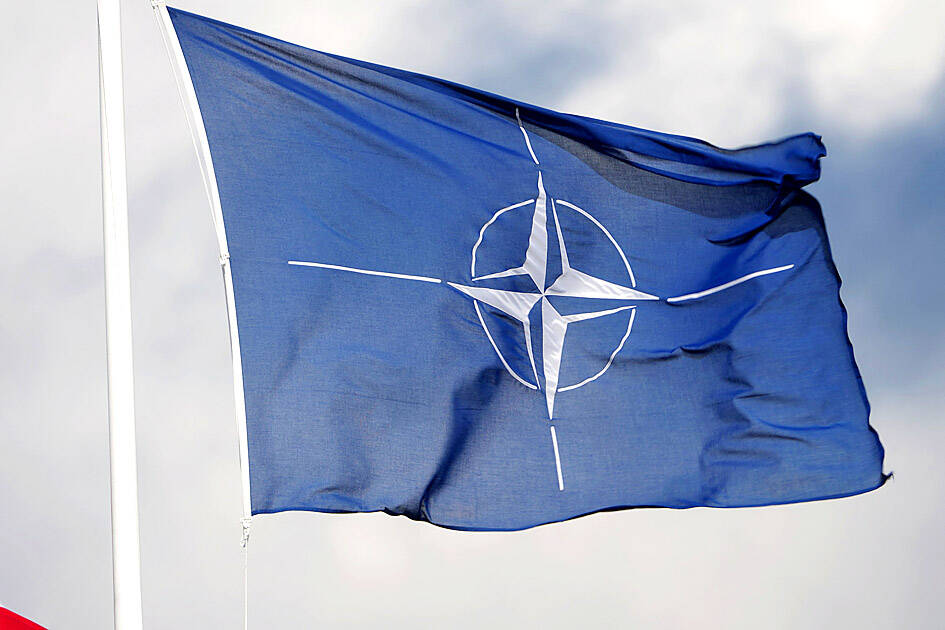NATO is reportedly planning to open a liaison office in Japan to coordinate with close partners across the Indo-Pacific region including Australia, South Korea and New Zealand.
The plans are likely to attract criticism from the Chinese government, which has previously warned the Western alliance against extending “its tentacles to the Asia-Pacific.”
Nikkei Asia yesterday reported that NATO and Japan plan to upgrade their cooperation on tackling cyberthreats, disinformation, and emerging and disruptive technologies.

Photo: Reuters
NATO’s planned new liaison office in Tokyo — to open next year — would be the first of its kind in Asia and would allow the military alliance to conduct periodic consultations with Japan and key partners, such as Australia, Nikkei Asia reported.
The move would be consistent with NATO’s increasing interest in developments in the Indo-Pacific. In its “strategic concept,” unveiled last year, NATO said that China posed “systemic challenges” to Euro-Atlantic security, even though Russia remained “the most significant and direct threat to allies’ security.”
NATO vowed to “strengthen dialogue and cooperation with new and existing partners in the Indo-Pacific to tackle cross-regional challenges and shared security interests.”
NATO accused China of carrying out “malicious hybrid and cyberoperations” and “remaining opaque about its strategy, intentions and military buildup.”
Australian Prime Minister Anthony Albanese has accepted an invitation to travel to the next NATO summit in Vilnius in July.
“Australia shares with NATO members a commitment to supporting democracy, peace and security, and upholding the rule of law,” a spokesperson for Albanese said last month.

DEFENDING DEMOCRACY: Taiwan shares the same values as those that fought in WWII, and nations must unite to halt the expansion of a new authoritarian bloc, Lai said The government yesterday held a commemoration ceremony for Victory in Europe (V-E) Day, joining the rest of the world for the first time to mark the anniversary of the end of World War II in Europe. Taiwan honoring V-E Day signifies “our growing connections with the international community,” President William Lai (賴清德) said at a reception in Taipei on the 80th anniversary of V-E Day. One of the major lessons of World War II is that “authoritarianism and aggression lead only to slaughter, tragedy and greater inequality,” Lai said. Even more importantly, the war also taught people that “those who cherish peace cannot

STEADFAST FRIEND: The bills encourage increased Taiwan-US engagement and address China’s distortion of UN Resolution 2758 to isolate Taiwan internationally The Presidential Office yesterday thanked the US House of Representatives for unanimously passing two Taiwan-related bills highlighting its solid support for Taiwan’s democracy and global participation, and for deepening bilateral relations. One of the bills, the Taiwan Assurance Implementation Act, requires the US Department of State to periodically review its guidelines for engagement with Taiwan, and report to the US Congress on the guidelines and plans to lift self-imposed limitations on US-Taiwan engagement. The other bill is the Taiwan International Solidarity Act, which clarifies that UN Resolution 2758 does not address the issue of the representation of Taiwan or its people in

US Indo-Pacific Commander Admiral Samuel Paparo on Friday expressed concern over the rate at which China is diversifying its military exercises, the Financial Times (FT) reported on Saturday. “The rates of change on the depth and breadth of their exercises is the one non-linear effect that I’ve seen in the last year that wakes me up at night or keeps me up at night,” Paparo was quoted by FT as saying while attending the annual Sedona Forum at the McCain Institute in Arizona. Paparo also expressed concern over the speed with which China was expanding its military. While the US

‘FALLACY’: Xi’s assertions that Taiwan was given to the PRC after WWII confused right and wrong, and were contrary to the facts, the Ministry of Foreign Affairs said The Ministry of Foreign Affairs yesterday called Chinese President Xi Jinping’s (習近平) claim that China historically has sovereignty over Taiwan “deceptive” and “contrary to the facts.” In an article published on Wednesday in the Russian state-run Rossiyskaya Gazeta, Xi said that this year not only marks 80 years since the end of World War II and the founding of the UN, but also “Taiwan’s restoration to China.” “A series of instruments with legal effect under international law, including the Cairo Declaration and the Potsdam Declaration have affirmed China’s sovereignty over Taiwan,” Xi wrote. “The historical and legal fact” of these documents, as well